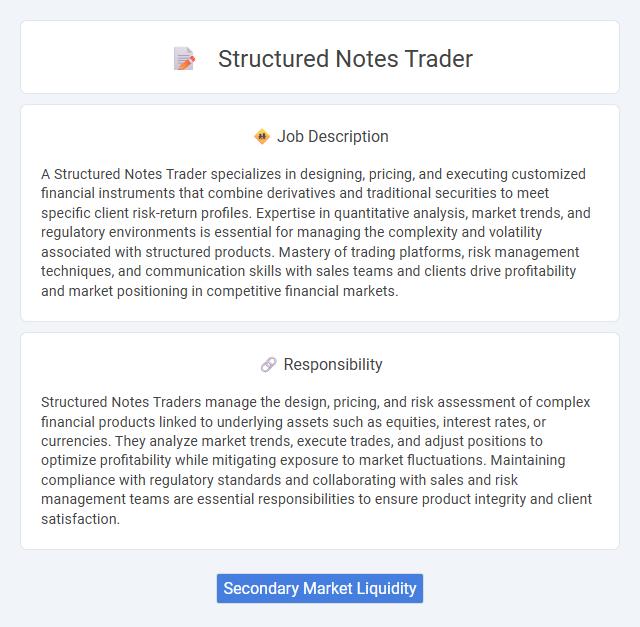
A Structured Notes Trader specializes in designing, pricing, and executing customized financial instruments that combine derivatives and traditional securities to meet specific client risk-return profiles. Expertise in quantitative analysis, market trends, and regulatory environments is essential for managing the complexity and volatility associated with structured products. Mastery of trading platforms, risk management techniques, and communication skills with sales teams and clients drive profitability and market positioning in competitive financial markets.
Individuals with strong analytical skills and attention to detail are likely well-suited for a Structured Notes Trader role, as the job demands careful assessment of complex financial instruments. Those who thrive in high-pressure environments and can manage risk effectively may find success in this position, while people who prefer routine tasks or have low tolerance for uncertainty might struggle. Given the fast-paced and dynamic nature of trading, adaptability and a solid understanding of market trends could be critical factors for suitability.
Qualification
A Structured Notes Trader must have a strong background in financial markets, quantitative analysis, and risk management, typically demonstrated by a degree in finance, mathematics, or economics. Proficiency in pricing models, derivatives, and trading platforms is essential, alongside experience with market data analysis and regulatory compliance. Advanced skills in programming languages such as Python, R, or MATLAB are highly valued to optimize trading strategies and automate pricing processes.
Responsibility
Structured Notes Traders manage the design, pricing, and risk assessment of complex financial products linked to underlying assets such as equities, interest rates, or currencies. They analyze market trends, execute trades, and adjust positions to optimize profitability while mitigating exposure to market fluctuations. Maintaining compliance with regulatory standards and collaborating with sales and risk management teams are essential responsibilities to ensure product integrity and client satisfaction.
Benefit
Structured Notes Traders likely benefit from the potential to earn substantial performance-based bonuses tied to market movements and trading success. They often have access to advanced financial tools and exclusive market insights that enhance decision-making accuracy. Exposure to a dynamic trading environment may also lead to accelerated skill development and career advancement opportunities.
Challenge
Structured Notes Trader jobs likely present significant challenges due to the complexity of designing and managing financial products that combine derivatives and fixed income instruments. The role probably requires advanced quantitative skills and the ability to assess market risks under volatile conditions. Navigating regulatory constraints and investor preferences may also add layers of difficulty, demanding adaptability and problem-solving expertise.
Career Advancement
Structured Notes Traders gain expertise in designing and executing complex financial instruments, enhancing their analytical and market assessment skills. Mastery in risk management and pricing models opens pathways to senior roles such as Portfolio Manager or Head of Trading. Advanced knowledge of derivatives and market trends accelerates career growth within investment banks or hedge funds.
Key Terms
Secondary Market Liquidity
A Structured Notes Trader specializing in Secondary Market Liquidity manages the buying and selling of structured financial products to ensure optimal market depth and trading efficiency. This role involves leveraging advanced analytics and market data to provide continuous bid-ask spreads, enhancing price discovery and mitigating liquidity risks. Expertise in derivative pricing models and real-time risk assessment is essential for maintaining balanced flow and supporting institutional investor demand.
 kuljobs.com
kuljobs.com